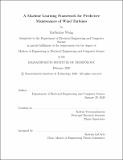| dc.contributor.advisor | Kalyan Veeramachaneni. | en_US |
| dc.contributor.author | Wang, Katherine(Katherine Yuchen) | en_US |
| dc.contributor.other | Massachusetts Institute of Technology. Department of Electrical Engineering and Computer Science. | en_US |
| dc.date.accessioned | 2021-02-19T21:01:16Z | |
| dc.date.available | 2021-02-19T21:01:16Z | |
| dc.date.copyright | 2020 | en_US |
| dc.date.issued | 2020 | en_US |
| dc.identifier.uri | https://hdl.handle.net/1721.1/129927 | |
| dc.description | Thesis: M. Eng., Massachusetts Institute of Technology, Department of Electrical Engineering and Computer Science, February, 2020 | en_US |
| dc.description | Cataloged from student-submitted PDF of thesis. | en_US |
| dc.description | Includes bibliographical references (pages 73-75). | en_US |
| dc.description.abstract | Wind energy is one of the fastest growing energy sources in the world. However, the failure to detect the breakdown of turbine parts can be very costly. Wind energy companies have increasingly turned to machine learning to improve wind turbine reliability. Thus, the goal of this thesis is to create a flexible and extensible machine learning framework that enables wind energy experts to define and build models for the predictive maintenance of wind turbines. We contribute two libraries that provide experts with the necessary tools to solve prediction problems in the wind energy industry. The first is GPE, which translates and uses the desired prediction problem to generate machine learning training examples from turbine operations data. The other library, CMS-ML, provides the architecture for building machine learning models using vibration data generated by turbine sensors within the Condition Monitoring System (CMS). With this architecture, we can easily create modular feature engineering and machine learning pipelines for the CMS signal data. Finally, we demonstrate the application of these two libraries on proprietary wind turbine data and analyze the effects of their parameters. | en_US |
| dc.description.statementofresponsibility | by Katherine Wang. | en_US |
| dc.format.extent | 75 pages | en_US |
| dc.language.iso | eng | en_US |
| dc.publisher | Massachusetts Institute of Technology | en_US |
| dc.rights | MIT theses may be protected by copyright. Please reuse MIT thesis content according to the MIT Libraries Permissions Policy, which is available through the URL provided. | en_US |
| dc.rights.uri | http://dspace.mit.edu/handle/1721.1/7582 | en_US |
| dc.subject | Electrical Engineering and Computer Science. | en_US |
| dc.title | A machine learning framework for predictive maintenance of wind turbines | en_US |
| dc.type | Thesis | en_US |
| dc.description.degree | M. Eng. | en_US |
| dc.contributor.department | Massachusetts Institute of Technology. Department of Electrical Engineering and Computer Science | en_US |
| dc.identifier.oclc | 1237565618 | en_US |
| dc.description.collection | M.Eng. Massachusetts Institute of Technology, Department of Electrical Engineering and Computer Science | en_US |
| dspace.imported | 2021-02-19T21:00:46Z | en_US |
| mit.thesis.degree | Master | en_US |
| mit.thesis.department | EECS | en_US |
